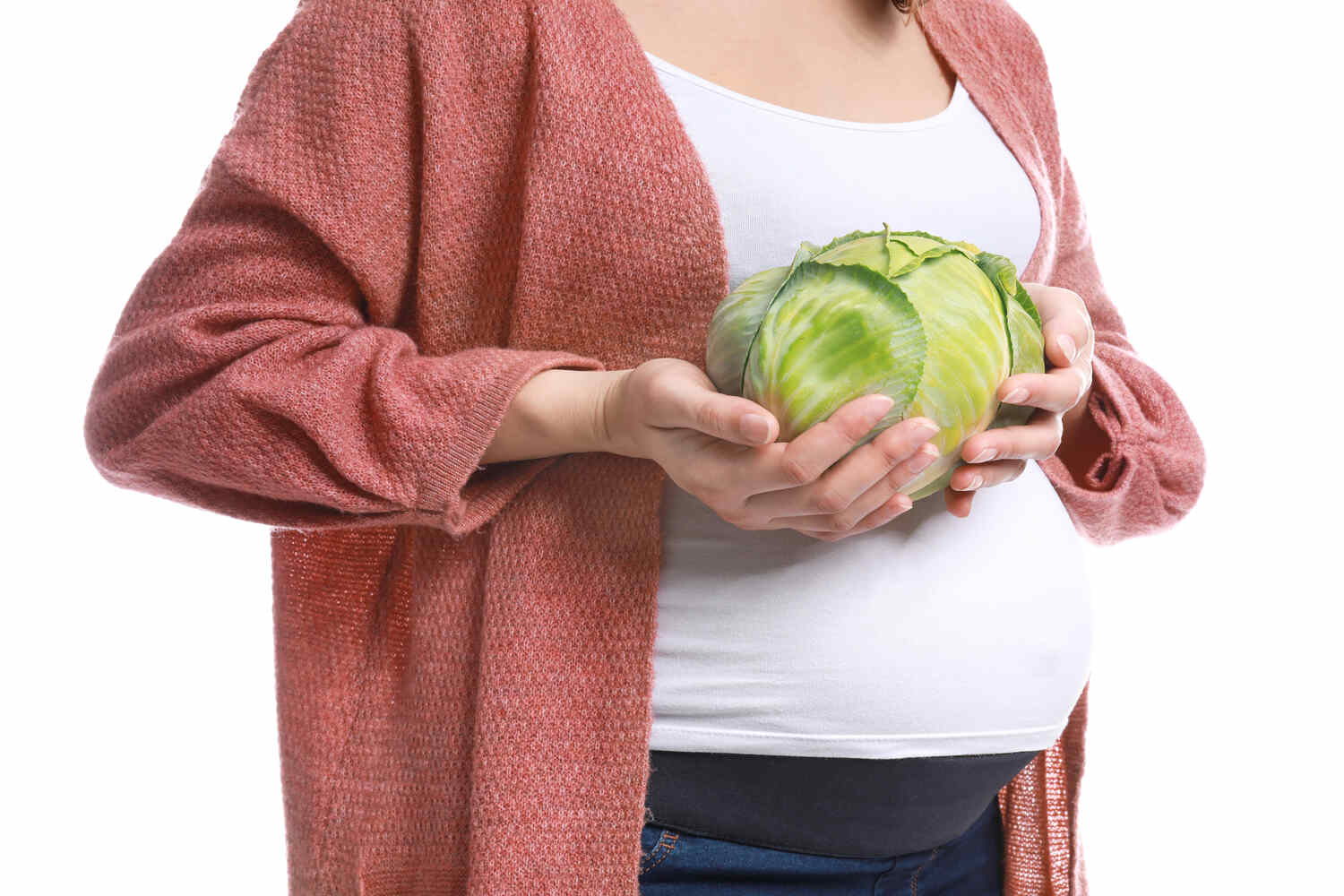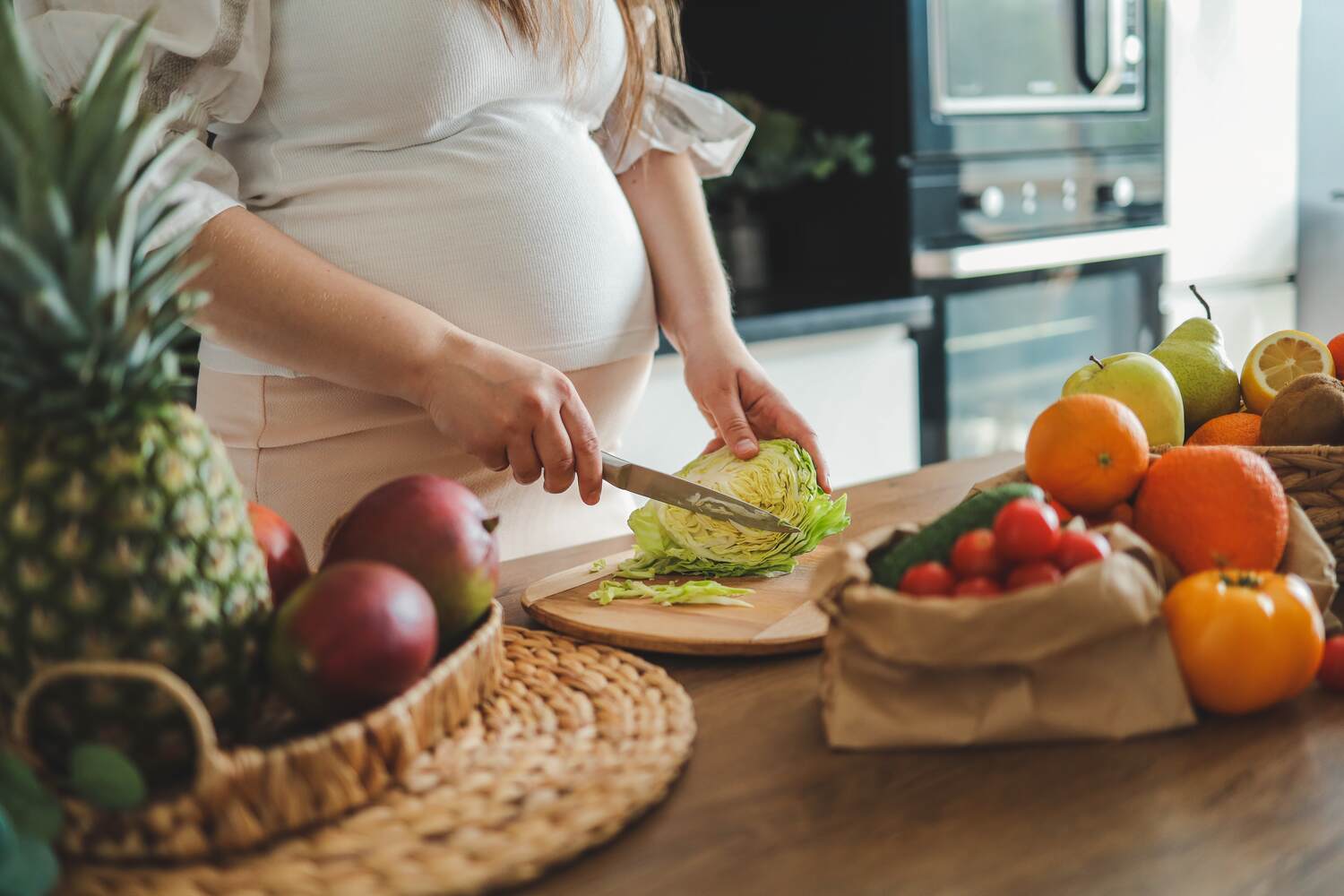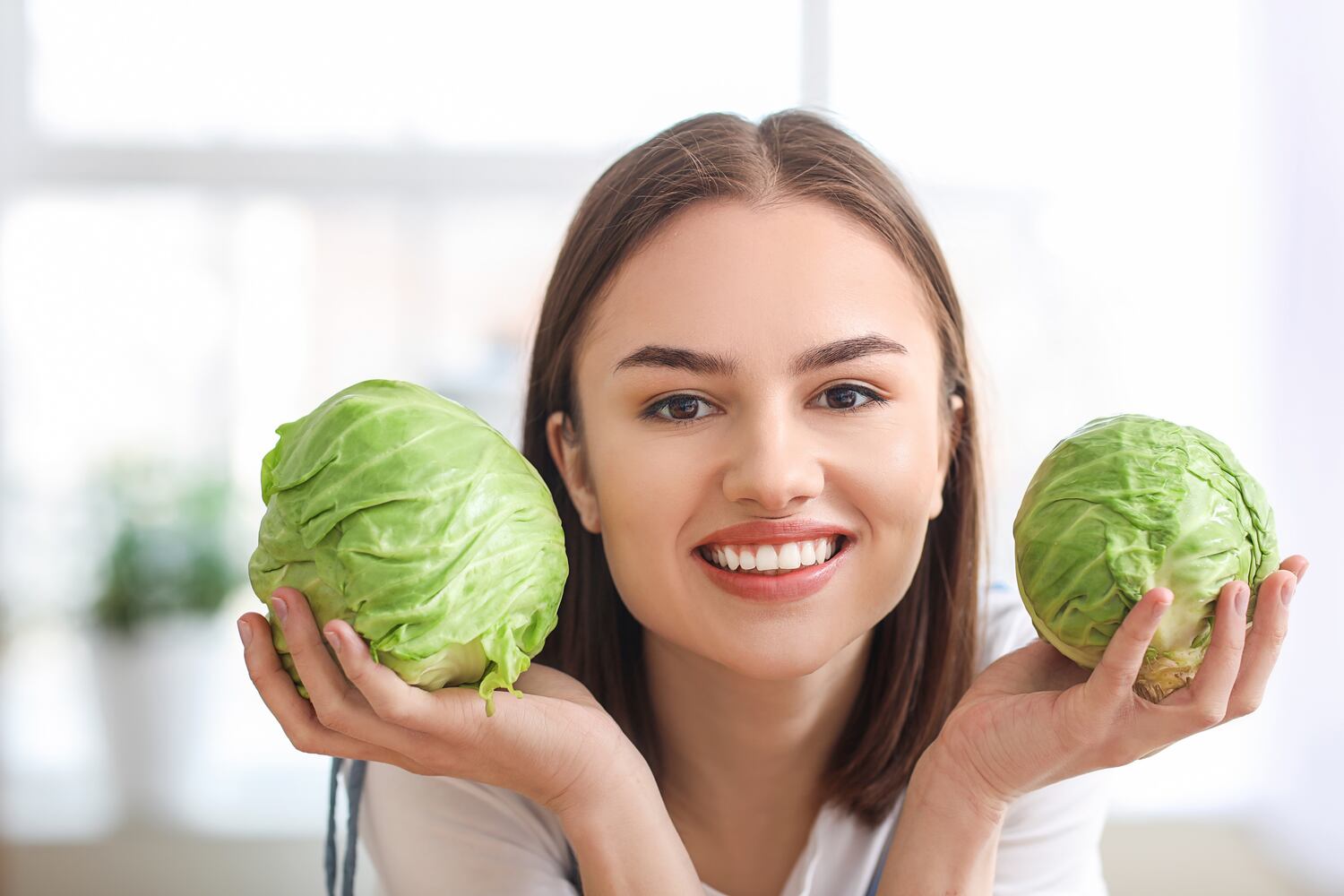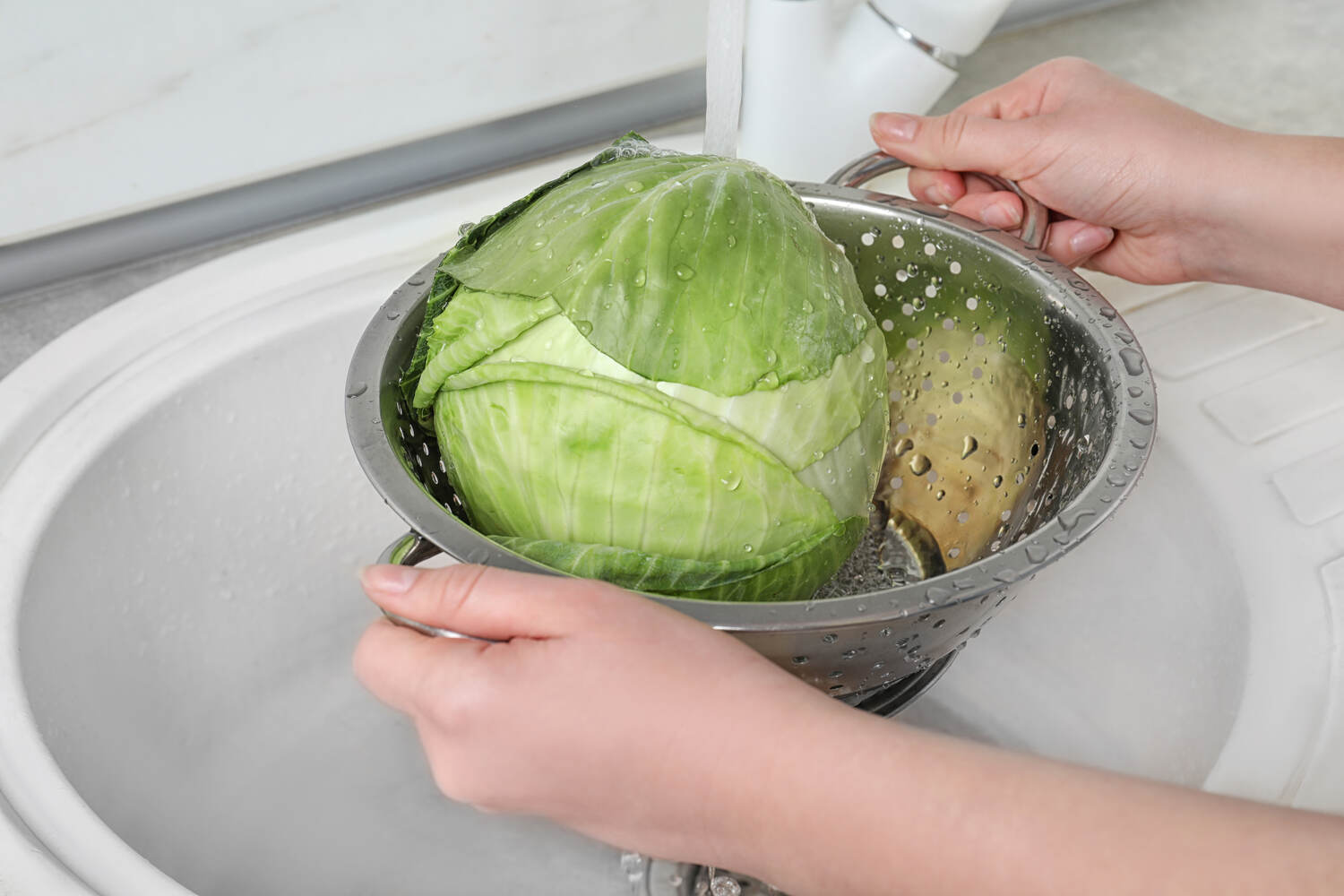
Although the joy of pregnancy is overwhelming, it is also a very vulnerable time for the mother-to-be. Along with all the other things you should and shouldn’t do during pregnancy, you need to avoid certain foods and eat healthy foods to keep yourself and your baby healthy. If a pregnant woman doesn’t pay attention to her food and lifestyle, it can hurt both her and her baby. Fresh fruits and veggies are great to consume during pregnancy and should be a big part of your diet. So, you might be wondering which veggies are good for you and which ones aren’t. In this article, we discuss the safety of cabbage during pregnancy.
When you are pregnant, cabbage is a very good food for you. It has a lot of nutrients that are good for the mother’s health and the baby’s growth and development. At the same time, there is a chance that it will get contaminated quickly. To keep yourself safe, you should know how to pick, cook, and eat cabbage the right way. Continue reading to find out more.
In This Article
- Nutritional Fact About Cabbage
- Is it Safe to Eat Cabbage While Pregnant?
- Which Variety of Cabbage is More Beneficial During Pregnancy- Green or Purple?
- What are the Benefits of Eating Cabbage During Pregnancy?
- Why Can’t I Eat Raw Cabbage While Pregnant?
- When Should Eating Cabbage Avoided During Pregnancy?
- Things To Remember While Eating Cabbage During Pregnancy
- FAQ’s
Nutritional Facts About Cabbage
Cabbage is a low-calorie, fiber-rich vegetable. This leafy ball is loaded with nutrients that are essential for your body. According to USDA, 100 grams of cabbage contain (1):
| Nutrients | Value |
| Water | 92.2 g |
| Energy | 25 Kcal |
| Carbohydrate | 5.8 g |
| Fiber | 2.5 g |
| Calcium | 40 mg |
| Magnesium | 12 mg |
| Phosphorus | 26 mg |
| Potassium | 170 mg |
| Sodium | 18 mg |
| Vitamin C | 36.6 mg |
| Folate | 43 µg |
| Choline | 10.7 mg |
| Vitamin A | 98 IU |
| Beta Carotene | 42 µg |
| Lutein + zeaxanthin | 30 µg |
| Vitamin K | 76 µg |
Iron, zinc, copper, manganese, and selenium are also present. Vitamins like thiamine, riboflavin, niacin, pantothenic acid, and vitamin B-6 are present in tiny amounts.
Is it Safe to Eat Cabbage While Pregnant?

Cabbage is generally considered safe to eat during pregnancy when consumed in moderate amounts as part of a balanced diet. Cabbage is a nutritious vegetable that provides essential vitamins, minerals, and fiber. You ought to consider eating cabbage during pregnancy, as it holds numerous medical advantages. It is rich in nutrients and almost has a similar effect as taking multivitamin tablets during pregnancy.
Make sure to wash the cabbage thoroughly to remove any dirt or pesticides. Proper cooking methods, such as boiling, steaming, or stir-frying, can help eliminate potential contaminants. And just like all food, moderation is the key when it comes to consuming cabbage during pregnancy. There are several types of cabbage, each with its own distinct characteristics and culinary uses. They come in green, purple, and white colors. Each has separate nutritional benefits.
Which Variety of Cabbage is More Beneficial During Pregnancy – Green Or Purple?

Both green and purple cabbage are nutritious vegetables, and including a variety of colorful vegetables in your diet during pregnancy is generally beneficial. However, there isn’t strong evidence to suggest that one color of cabbage is significantly more beneficial than the other, specifically for pregnancy.
Green cabbage is the most consumed variety. Purple cabbage possesses not only more nutritional benefits but also a heartier flavor than green ones. The rich color of the purple cabbage is due to the presence of anthocyanin pigments (2). Anthocyanin polyphenols contribute more protective phytonutrients to purple cabbage than the green one. Therefore, some experts say purple cabbage may provide more protective, preventive, and therapeutic roles than the other varieties. However, the evidence on the specific benefits of it for pregnancy is not conclusive.
The following table helps to compare the nutritional benefit of purple cabbage over the green one.
Purple and Green Cabbage Nutrition Comparisons Are as follows:
| 100 Grams of Purple Cabbage | 100 Grams of Green Cabbage |
| 196.5 mg of Polyphenol Of which 28.3 mg is Anthocyanin |
45 mg of Polyphenol Of which 0.01 mg of Anthocyanin |
| Provides 33% of the daily required intake of Vitamin A | Provides 3% of the daily required intake of Vitamin A |
| 51 mg of Vitamin C (Pregnant women need around 85 mg per day.) |
37 mg of Vitamin C (Pregnant women need around 85 mg per day) |
| 0.7 mg of Iron | 0.4 mg of Iron |
[Read: Is It Safe To Eat Lettuce During Pregnancy?]
What are the Benefits of Eating Cabbage During Pregnancy?

Regardless of which variant of this nutrient-rich vegetable you choose, you should add it to your pregnancy diet. To make sure you and your unborn child are safe and to reap its health benefits, make sure you choose the right type and consume it the right way.
Following are 12 amazing health benefits of eating cabbage during pregnancy:
1. Helps in Satisfying Increased Nutrient Needs Without Gaining Weight
During the second and third trimesters, an expecting mother needs only 300 extra calories per day. However, most of the time, to attain the extra calories, expect mothers to eat more food and thus gain more weight. Gaining more weight during this phase of pregnancy can trigger preterm delivery and C-sections. It not only increases the risk of being overweight after delivery but also increases the odds of giving birth to an overweight baby (3).
Cabbage is low in calories and provides various essential nutrients without contributing to excessive weight gain, which means that you can consume as much as you need without worrying about putting on weight. At the same time, this vegetable provides most of the vital nutrients.
2. Helps to Regulate Bowel Movements
Between eleven percent and thirty-eight percent of pregnant women experience constipation at some point (4). Cabbage is a vegetable that is rich in fiber. Fiber can contribute to the regulation of bowel movements (5). Fiber adds bulk to the stool and helps prevent constipation by promoting regular bowel movements. It also helps soften the stool, making it easier to pass.
Cabbage contains both soluble and insoluble fiber (6). Soluble fiber can dissolve in water and form a gel-like substance in the digestive tract, while insoluble fiber adds bulk to the stool. Both types of fiber are beneficial for maintaining a healthy digestive system.
3. May Contribute To Prevent Neural Tube Defects
Cabbage, just like other leafy greens, has folate (also called vitamin B9), which is important for different bodily functions like cell division and DNA formation. Folate is really important during pregnancy because it plays a big role in preventing neural tube defects in developing fetuses (7).
Neural tube defects are pretty serious birth defects that happen when the neural tube, which eventually forms the brain and spinal cord in a developing fetus, doesn’t close properly. Neural tube defects can have significant and long-lasting impacts, affecting physical and cognitive abilities throughout life.
4. May Contribute To Bone Health
It is important to pay attention to bone health during pregnancy to reduce the risk of osteoporosis in the future. Cabbage can contribute to bone health as it contains several nutrients that play a role in maintaining strong and healthy bones. For example, cabbage is a good source of vitamin K, magnesium, and phosphorous. Likewise, while cabbage is not as high in calcium as some other leafy greens, it still provides a moderate amount of this essential mineral. All these minerals are necessary for maintaining bone density and preventing conditions like osteoporosis (8).
5. Anticancer Property
A member of the cruciferous family, cabbage is rich in phytochemicals, vitamins, and minerals, some of which may have anti-cancer effects. Cruciferous vegetables, such as cabbage, are high in molecules called glucosinolates (9). When the vegetable is chewed or minced, these compounds may be converted into beneficial substances like indoles and isothiocyanates. According to studies, these substances may have anti-cancer properties, especially when it comes to warding against malignancies of the prostate, breast, lung, and colon (10).
6. Regulates the Blood Pressure and Prevent CVD
High blood pressure during pregnancy, known as gestational hypertension, can have serious implications for both the mother and the baby. Pregnant women need to focus on a diet that supports overall cardiovascular health and helps regulate blood pressure. Cabbage is a rich source of electrolytes. It is loaded with minerals like calcium, magnesium, potassium, and phosphorous. These minerals are vital for regulating heart rate and blood pressure (11).
The antioxidants found in red cabbage, especially beta-carotene and lutein, help to prevent CVD (Cardio Vascular Diseases) (12). It also helps to prevent artery hardening. Cabbage has anti-inflammatory properties that are beneficial to heart health. Your heart deserves extra attention when you are pregnant.
7. Regular Consumption Reduces the Risk of Anemia
Iron is essential for the formation of RBC (13). Given that a pregnant woman’s blood volume rises by more than 50% throughout her pregnancy, anemia may be a concern. Cabbage has a respectable quantity of iron while not being a very rich source. You may reduce the odds or fight anemia by including cabbage in your diet regularly.
Vitamin C, which is abundant in cabbage, improves the body’s ability to absorb non-heme iron from plant-based diets. Eating vitamin C-rich foods along with meals that are high in iron can increase iron absorption rates (14). Similarly, vitamin B6 and folate (vitamin B9) found in cabbage are essential for the production of red blood cells (15).
8. Treat Swollen Legs
Swollen legs are common in the course of pregnancy, especially during the third trimester. Wrapping cabbage leaves around the legs reduces this swelling and provides comfort. Thanks to the anti-inflammatory effect of cabbage leaves (16).
9. Treating Gestational Diabetes
Gestational diabetes is commonly found among expecting mothers. Cabbage is a good source of dietary fiber. Fiber can help slow down the absorption of sugar and improve blood sugar control (17). The high fiber content of cabbage helps in controlling the blood sugar level, thereby decreasing the danger of gestational diabetes during pregnancy. Also, cabbage is low in calories and carbohydrates, making it a good option for those looking to manage their blood sugar levels.
10. Promote Eye Health
The surging hormones during pregnancy can change the quality of your eyesight. Many expecting mothers experience issues like blurry vision and dry eyes during pregnancy. Cabbage is a rich source of beta-carotene. Beta-carotene is good for eye health (18). So eating cabbage during pregnancy promotes good eye health in expecting mothers.
[Read: Is It Safe To Eat Radish During Pregnancy?]
Why Can’t I Eat Raw Cabbage While Pregnant?

You must always opt for properly washed and thoroughly cooked cabbage during pregnancy.
Here are the reasons:
- One potential concern is the risk of foodborne illnesses. Raw vegetables, including cabbage, can be contaminated with bacteria such as E. coli or Salmonella. These bacteria can cause foodborne illnesses that may be more severe in pregnant women, as they have a weakened immune system. Food-borne diseases in pregnant women can be more dangerous than in women who are not pregnant, as they can trigger a miscarriage, preterm labor, and even stillbirth in the course of pregnancy. To minimize this risk, it’s crucial to wash vegetables thoroughly before consumption.
- Another consideration is related to digestion. Some individuals may experience digestive discomfort, such as bloating or gas when consuming raw cabbage.
- The constant utilization of pesticides and fungicides on cabbage makes them unsafe to consume. Washing and cooking the cabbage thoroughly before eating ensures that the cabbage is free of these dangerous chemicals to guarantee a sound pregnancy. It is more beneficial to go for organic cabbage in the course of pregnancy.
When Should Eating Cabbage Be Avoided During Pregnancy?

Given its rich nutritional profile, cabbage is generally considered a safe and healthy choice for pregnant women. There are certain situations where it is best to avoid consuming cabbage or to consult a doctor before doing so.
1. If The Pregnant Woman Experience Gas And Bloating
Cabbage belongs to the cruciferous vegetable family, which can sometimes cause gas and bloating. If you experience discomfort or increased gas after eating cabbage, you may want to limit your intake or try different cooking methods, such as steaming or boiling, which can make it easier to digest.
2. If Pregnant Woman Has Thyroid Issues
Cabbage belongs to the cruciferous vegetable family, which contains substances called goitrogens that can interfere with iodine absorption (19). Iodine is crucial for thyroid function, especially during pregnancy. While cooking reduces the goitrogenic effect, excessive consumption of raw cabbage might be a concern for individuals with thyroid issues. If you have thyroid problems, it’s advisable to consult with your healthcare provider to determine a suitable dietary approach.
3. Blood Clotting Concerns
Cabbage is a good source of vitamin K, which plays a crucial role in blood clotting (20). While vitamin K is essential for overall health, excessive intake may interfere with anticoagulant medications. If you are on blood-thinning medications, it’s important to maintain a consistent intake of vitamin K and discuss your dietary choices with your healthcare provider.
Things To Remember While Eating Cabbage During Pregnancy

Here are some key points to keep in mind:
1. Wash Thoroughly
Ensure that the cabbage is washed thoroughly before consumption to remove any dirt or pesticides that may be present on the leaves.
2. Never Buy Pre-Cut Cabbage
Never buy halved or shredded cabbage, as the vitamin C content of the cabbage starts to reduce once it is cut.
3. Cooking Methods
Opt for cooking methods like boiling, steaming, or stir-frying instead of eating raw cabbage. Cooking helps eliminate potentially harmful bacteria and parasites that might be present in raw vegetables.
4. Keep the Sliced Cabbage Aside For 5-10 minutes Before Cooking
This helps to let the myrosinase enzymes in the shredded cells of the cabbage become active.
[Read: 10 Amazing Benefits of Eating Broccoli During Pregnancy]
FAQ’s
1. Can I Eat Raw Cabbage During Pregnancy?
Your system is very sensitive during pregnancy. It is recommended to eat well-cooked foods in this phase. Cabbage, when not washed and cooked well, can carry bacteria like listeria.
2. Can I Eat Purple Cabbage When Pregnant?
You can eat purple cabbage during pregnancy. Ensure it’s thoroughly washed and cooked to minimize the risk of contaminants and enjoy it as part of a balanced diet for added nutrients.
3. Can I Eat Cabbage Daily When Pregnant?
You can include cabbage in your daily diet during pregnancy, but ensure variety by incorporating a range of fruits, vegetables, and other nutrient-rich foods for a well-balanced and healthy pregnancy. Regular consumption can increase the iron content in your body. It has many other benefits, too.
4. Can Eating Cabbage During Pregnancy Benefit My Unborn Child?
Cabbage is rich in folic acid. This is important for the neural development of the baby. So eating cabbage during pregnancy benefits the baby in the womb.
Read Also: 8 Benefits Of Eating Cauliflower During Pregnancy
Reference
- Cabbage, raw – [https://fdc.nal.usda.gov/fdc-app.html#/food-details/169975/nutrients]
- Anthocyanidins and anthocyanins: colored pigments as food, pharmaceutical ingredients, and the potential health benefits – [https://www.ncbi.nlm.nih.gov/pmc/articles/PMC5613902/]
- Pregnancy and birth: Weight gain in pregnancy – [https://www.ncbi.nlm.nih.gov/books/NBK279575/]
- Treating constipation during pregnancy – [https://www.ncbi.nlm.nih.gov/pmc/articles/PMC3418980/]
- Effect of dietary fiber on constipation: A meta-analysis – [https://www.ncbi.nlm.nih.gov/pmc/articles/PMC3544045/]
- Fiber Content of Selected Vegetables – [https://www.ncbi.nlm.nih.gov/books/NBK326737/table/lipids_lifestyle-changes-lipids-and-lipoproteins.T._7/]
- Folic Acid Supplementation and Pregnancy: More Than Just Neural Tube Defect Prevention – [https://www.ncbi.nlm.nih.gov/pmc/articles/PMC3218540/]
- The Effects of Calcium, Magnesium, Phosphorus, Fluoride, and Lead on Bone Tissue – [https://www.ncbi.nlm.nih.gov/pmc/articles/PMC8066206/]
- Analysis of Processing Effects on Glucosinolate Profiles in Red Cabbage by LC-MS/MS in Multiple Reaction Monitoring Mode – [https://www.ncbi.nlm.nih.gov/pmc/articles/PMC8433700/]
- Cruciferous Vegetables and Cancer Prevention – [https://www.cancer.gov/about-cancer/causes-prevention/risk/diet/cruciferous-vegetables-fact-sheet]
- Dietary macrominerals: Updated review of their role and orchestration in human nutrition throughout the life cycle with sex differences – [https://www.ncbi.nlm.nih.gov/pmc/articles/PMC9932710/]
- Carotenoids and cardiovascular health – [https://www.sciencedirect.com/science/article/pii/S0002916523294551]
- Review on iron and its importance for human health – [https://www.ncbi.nlm.nih.gov/pmc/articles/PMC3999603/]
- Interaction of vitamin C and iron – [https://pubmed.ncbi.nlm.nih.gov/6940487/]
- New insights into erythropoiesis: the roles of folate, vitamin B12, and iron – [https://pubmed.ncbi.nlm.nih.gov/15189115/]
- The Anti-Inflammatory Effect of Cabbage Leaves Explained by the Influence of bol-miRNA172a on FAN Expression – [https://www.ncbi.nlm.nih.gov/pmc/articles/PMC8987499/]
- Effects of dietary fiber on glycemic control and insulin sensitivity in patients with type 2 diabetes: A systematic review and meta-analysis – [https://www.sciencedirect.com/science/article/pii/S1756464621001493]
- A Mechanistic Review of β-Carotene, Lutein, and Zeaxanthin in Eye Health and Disease – [https://pubmed.ncbi.nlm.nih.gov/33114699/]
- The role of micronutrients in thyroid dysfunction – [https://www.ncbi.nlm.nih.gov/pmc/articles/PMC7282437/]
- Vitamin K: the effect on health beyond coagulation – an overview – [https://www.ncbi.nlm.nih.gov/pmc/articles/PMC3321262/]
